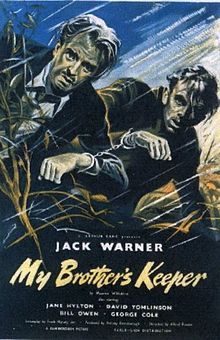- My Brother's Keeper (1948 film)
-
My Brother's Keeper 
UK release posterDirected by Alfred Roome Produced by Sydney Box Written by Frank Harvey Starring Jack Warner
George ColeMusic by Clifton Parker Cinematography Gordon Lang Editing by Esmond Seal Studio Gainsborough Pictures Release date(s) 9 August 1948 Running time 96 min. Country UK Language English My Brother's Keeper is a 1948 British crime film in the form of a convicts-on-the-run chase thriller, directed by Alfred Roome for Gainsborough Pictures. It was the first of only two films directed by Roome (the other being the following year's comedy It's Not Cricket) during a long career as a film editor. The film stars Jack Warner and George Cole and was produced by Sydney Box.
Contents
Plot
Handcuffed together, George Martin (Jack Warner) and Willie Stannard (George Cole) are two newly-convicted criminals being transported to prison. Martin is a hardened, cynical career criminal, while Stannard is a naïve, rather dull-witted youth who has never previously been in trouble with the law, maintains his innocence of the rape for which he has been convicted and is terrified by the prospect of prison. During the journey the pair manage to escape. Martin steals an army officer's uniform and passes Stannard off as a deserter in his charge, being returned to face a military tribunal.
The escape location has been chosen by Martin for its proximity to a garage run by his mistress Nora Lawrence (Jane Hylton), who provides the pair with overnight shelter. The following day Martin and Stannard take refuge in a derelict isolated cottage. While trying to file their handcuffs apart they are surprised by a hunting man with a gun. A struggle ensues, during which Martin shoots and kills the man. Shortly thereafter they manage to separate the handcuffs and Martin abandons Stannard, going on the run alone while Stannard gives himself up and is promptly charged with murder.
Martin manages to contact his wife in London, asking if she can find a way to get money to him. She arranges to travel by taxi to the woods in which he is hiding. Just as she arrives, the police have tracked Martin down and have him cornered. Rather than give himself up, Martin makes a final doomed attempt to escape through a signed minefield, watched by police, reporters, his wife and mistress and a crowd of sensation-seeking gawkers.
Cast
- Jack Warner as George Martin
- Jane Hylton as Nora Lawrence
- David Tomlinson as Ronnie Waring
- Bill Owen as Syd Evans
- George Cole as Willie Stannard
- Yvonne Owen as Meg Waring
- Raymond Lovell as Bill Wainwright
- Brenda Bruce as Winnie Foreman
- Susan Shaw as Beryl
- Beatrice Varley as Jenny Martin
- Garry Marsh as Brewster
- Maurice Denham as Superintendent Trent
- Frederick Piper as Gordon
- Wilfrid Hyde-White as Harding
- John Boxer as Police Sergeant Bert Foreman
- Amy Veness as Mrs. Gully
- Fred Groves as Crown Hotel landlord
- Arthur Hambling as Edward Hodges
- Valentine Dyall as Inspector at Milton Wells
- George Merritt as Constable at Milton Wells
- Jack Raine as Chief Constable Col. Heatherly
Reception
My Brother's Keeper is a well-regarded film, with a reputation as a tight, tense and fast-moving thriller with Roome's previous editing experience being well utilised. The characterisation of the two main protagonists is praised for going deeper than the stereotypes of the tough, reckless criminal and the dim, hapless innocent. Via the 1950 film The Blue Lamp, and Dixon of Dock Green, the TV series developed from it which ran until the mid 1970s, Warner became forever engrained on the British consciousness as George "Evenin' all" Dixon, the avuncular upholder of law and order. My Brother's Keeper is often cited as an example of the dramatic range of which Warner was capable, before he became typecast. Cole's performance too is credited as one of the factors in his unusually smooth transition from child star to adult actor. The film's main weakness is cited as the interpolation of a pseudo-comic and largely irrelevant subplot involving a newspaper reporter trying to cover the story while on honeymoon in the area.
Location filming
My Brother's Keeper's exterior location sequences were filmed in the Buckinghamshire/Oxfordshire border area, including scenes shot at the now abandoned Aston Rowant railway station.
See also
External links
- My Brother's Keeper (1948) at the Internet Movie Database
- My Brother's Keeper (1948 film) at AllRovi
- My Brother's Keeper at BFI Screen Online
- My Brother's Keeper at BritMovie
Films produced by Gainsborough Pictures The "Gainsborough melodramas" The Man in Grey (1943) · Madonna of the Seven Moons (1944) · Fanny by Gaslight (1944) · The Wicked Lady (1945) · Caravan (1946) · Jassy (1947)Other The Passionate Adventure (1924) · The Rat (1925) · The Triumph of the Rat (1926) · Blighty (1927) · The Constant Nymph (1928) · The First Born (1928) · The Return of the Rat (1929) · Taxi for Two (1929) · Hindle Wakes (1931) · It's a Boy (1933) · Friday the Thirteenth (1933) · Wild Boy (1934) · My Old Dutch (1934) · Oh, Mr Porter! (1937) · Doctor Syn (1937) · Strange Boarders (1938) · The Ghost Train (1941) · I Thank You (1941) · Back-Room Boy (1942) · Uncensored (1942) · Love Story (1944) · Time Flies (1944) · Give Us the Moon (1944) · Bees in Paradise (1944) · Two Thousand Women (1944) · Waterloo Road (1945) · A Place of One's Own (1945) · They Were Sisters (1945) · The Magic Bow (1946) · The Root of All Evil (1947) · Dear Murderer (1947) · Easy Money (1948) · Miranda (1948) · My Brother's Keeper (1948) · It's Not Cricket (1949) · The Huggett family seriesCategories:- English-language films
- 1948 films
- 1940s crime films
- British films
- British crime films
- Gainsborough Pictures films
- Chase films
- Black-and-white films
- Directorial debut films
Wikimedia Foundation. 2010.
